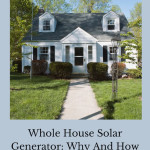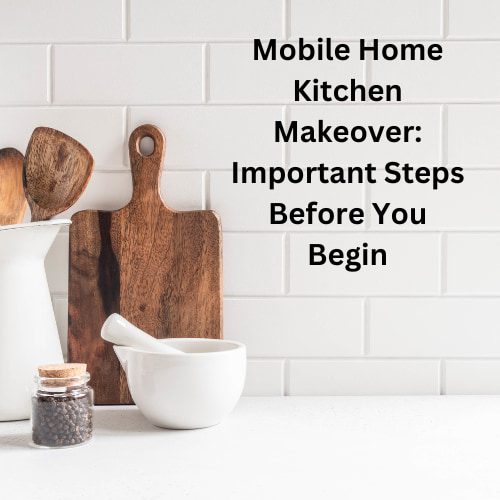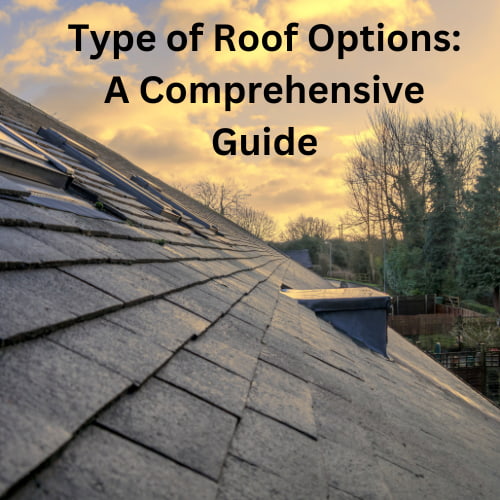Whole House Solar Generator: Why And How To Choose
Are you thinking about a whole house solar generator? Here is some great information on why and how to choose one for your home.
There’s been a growing wave of rising energy costs and an increased focus on sustainable living worldwide. It’s pushing more people to use solar generators as an alternative energy source. Homes are efficiently generating electricity from the sun and using the energy to power lights, appliances, and other devices.
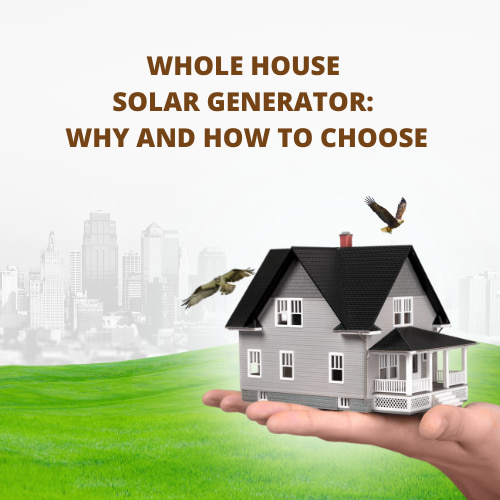
If you’re considering purchasing this equipment, you must have all the necessary information about solar generator for house. It includes how your home can benefit from a solar-powered generator and what to look for when buying one. Keep reading to learn more.
What Is A Solar Generator?
A solar generator is an energy system with solar panels that collect and convert the sun’s energy into electricity. Solar panels are usually mounted on roofs and connected to inverters, converting energy into usable electricity. Most systems also have battery packs that allow you to store and use that energy whenever needed.
These generators also come in many forms and can be used for various applications. Here are the different types of solar generators in the market:
Portable Generators
Portable solar units are great for those who need electricity around the compound or on the go. It’s also a perfect option if you only have a little space at home to install more extensive systems. One or two solar panels are typically used to power these small, lightweight systems. They also come either with built-in or separate batteries that you charge and bring along with you.
Most portable units have alternating current (AC) outlets to power laptops, phones, lights, and other electronics. While they can’t charge large appliances like a fridge, they’re perfect for homes with minimal electricity requirements. A solar backup generator can come in handy as a home backup during a power outage.
Grid-Tied Generators
This type of system attaches directly to your electrical grid. It allows the generated energy to be used immediately, and the excess gets sold back for a profit.
Off-Grid Generators
Solar generators can also be off-grid. They’re designed to provide an uninterrupted power supply in areas without access to outside sources of electricity. They’re also large, as they must have enough capacity to run large appliances like air conditioners.
Off-grid generators also have extra components like power controllers and meters for easy monitoring of the system. They are the best whole house generators.
Hybrid Generators
Off-grid and grid-tied technologies also combine into one hybrid system. These generators are useful since they provide emergency backup power and feed excess energy into your local grid. Hybrid solar systems usually include solar panels, an inverter, batteries for energy storage, and a transfer switch. These allow you to change between grid power and solar power as needed easily. It makes it perfect if you use grid-tied systems but also need reliable power in case of an outage.
These are the four main types of solar power generators you can use for your home.
Why A Solar Generator Is An Excellent Choice
Here’s why you probably need solar generators for your home:
They Help You Save On Costs
One of the main benefits of using these generators is saving on cost. Solar energy is free, which reduces or eliminates reliance on the electric grid. It, therefore, reduces your energy bills. Solar generators also have a long lifespan and require minimal maintenance once set up. They also come with warranty protection plans.
Therefore, even though installing these technologies is expensive, it’s cost-effective in the grand scheme of things.
You’re Protecting The Ecosystem
When you use a solar harnessing system, you help reduce your carbon footprint. That’s because you’re avoiding burning fossil fuels contributing to global warming. Solar energy produces no emissions. It’s also a renewable source of energy. Therefore, using it means that non-renewable resources like fuels making electricity are conserved. Using solar generators is a way of contributing to environmental sustainability.
Most systems also come with built-in battery storage capacity. Excess energy produced during sunny days can be stored for cloudy days, further preserving the planet’s precious resources.
There Are No Noise Disruptions
Solar panels are also silent when used compared to gas or diesel generators. Solar cells absorb the light without making any noises, so they don’t disturb you or your neighbors. For this reason, they’re highly recommended for sensitive areas where noise pollution can land you in trouble.
Your Home Increases In Value
Investing in solar power also increases the worth of your home. As renewable energy sources become more widespread, buyers are also looking for homes that utilize clean energy. Homes powered by renewable sources of energy are increasingly fetching more market value.
You Have All The Freedom
Lastly, having solar-powered generators provides peace of mind. It allows you to be self-reliant and independent from electricity grids vulnerable to outages. It can be beneficial if you live in an area with load shedding and extreme weather, such as hurricanes, tornadoes, or blizzards. Your home will always have access to power, even when the rest of the neighborhood is left in the dark.
As seen above, solar generating systems can be of great benefit, both for you and the environment, in the long run. If you want to buy this equipment, here’s your sign.
How To Choose A Solar Generator
As mentioned earlier, solar generators are ideal for maximizing the sun’s renewable energy. However, with so many models on the market, how do you know which is right? Here are a few practical steps that will get you started.
Step One: Understand Your Needs
Before you begin the process, understand what kind of energy demand your home requires. First, consider all appliances and devices that require electricity. It includes lights, TVs, and major appliances such as refrigerators or ovens. Then estimate the wattage needed to run these items. With this information in mind, determine the size of the system to purchase.
It’s also important to consider whether or not you’ll need extra capacity during peak times. It’s when usage is higher than usual, such as when air conditioners run more than usual in summer. Once you have an idea of your needs, narrow down your options and find a unit that can meet them.
Step Two: Consider Your Budget
To determine the budget you’ll need, consider the type and size of the solar generators. Bigger generators, in terms of capacity, will cost more. Also, remember to add the cost of any additional components, like batteries or charge controllers.
There may also be extra installation costs depending on your location and the complexity of your system. Factor these into your budget too.
Some states offer incentives for using solar power. When putting your budget together, consider any state or federal incentives available to help offset some of the cost.
Step Three: Research Your Options
The third step involves exploring the different models available on the market. Check out independent review websites or speak with knowledgeable sales reps at stores. Experts will help you choose a user-specific system to meet your needs.
You can also consult with neighbors who have already installed these systems. They’ll give you unbiased recommendations on where to buy the best solar generators.
Step Four: Consider Your Location
Your location will also impact which generator system is best for your home. If you live in a sunny area, opting for a larger system with more panels makes sense. With these, you can expect more power output from the sun throughout the day. However, this may not be the case if you live in an area that experiences cloudy days or long winters.
It would help if you also considered any regulations that may be in place in your state or region. This is necessary because some areas restrict how much energy is generated using solar generating systems. Restrictions on what equipment they must contain are also in place, so review them before any purchase.
Step Five: Go For Quality Components
Opt for quality models when selecting components such as batteries, charge controllers, and inverters. Cheaper parts are always appealing at first glance but often only last for a short time and can be more prone to failure. Only purchase from reputable manufacturers with proven track records in reliability and performance over time.
Also, pay close attention to features such as portability, ease of use, maintenance requirements, and warranties. They also play a key role in determining how much you’ll get out of a particular unit.
Step Six: Install The System
Once you have purchased all of the components for your solar generator system, install it in your home. The installation process varies depending on the type of system you buy.
You can stall the system by yourself. However, you’ll need to be skillful at that. The best solution, however, is to hire a professional for installation. Experts help you set up the solar generator correctly and safely. This helps to avoid damage and repairs sooner than needed.
Step Seven: Consider Monitoring Capabilities
Finally, with the system installed, regularly monitor its performance. Remember to choose one with performance readings like energy production over time to help identify any issues early on. You can then address them before they become major problems or lead to expensive repairs down the line.
It’s also a good idea to watch for new technology developments related to renewable energy systems. This could improve your setup or make it more efficient in future years.
Choosing the right solar generator for your home is easier if you follow these steps. You’ll be able to find the perfect unit and make the most of renewable energy for years to come.
Whole House Solar Generator: Why And How To Choose Conclusion
Investing in a solar generator is undoubtedly a decision worth considering. It’s a great option that powers your home and reduces dependency on traditional energy sources. For a seamless experience, remember to consider size, power output, and price when choosing one for your home. These and other factors will help you confidently select the best clean and renewable energy system for your home.
Shop any of these stores and I receive a small commission at no cost to you.
 Echo Dot (4th Gen, 2020 rel...Shop on Amazon
Echo Dot (4th Gen, 2020 rel...Shop on Amazon Apple AirTagShop on Amazon
Apple AirTagShop on Amazon Amazon Fire TV Stick, sharp...Shop on Amazon
Amazon Fire TV Stick, sharp...Shop on Amazon
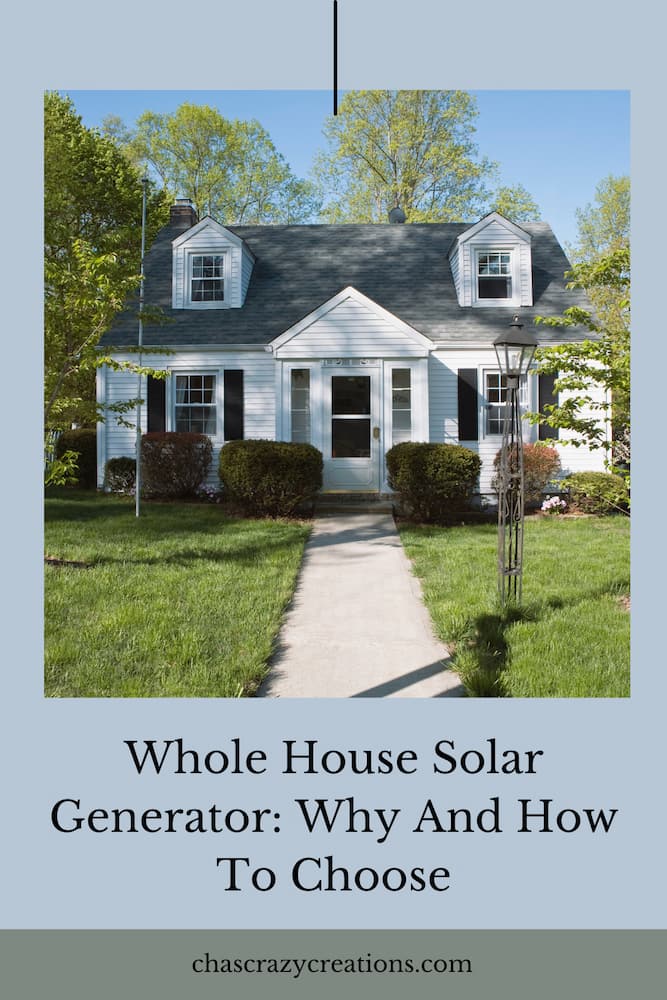
Check out some of my related posts!


